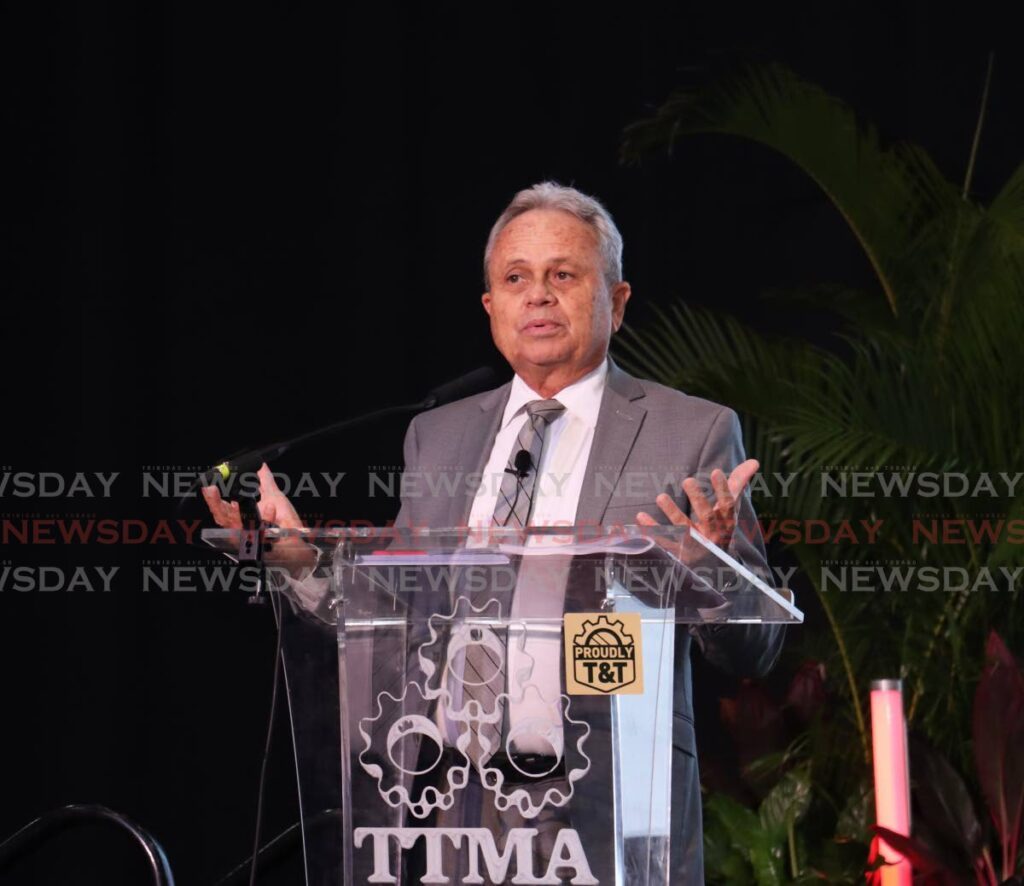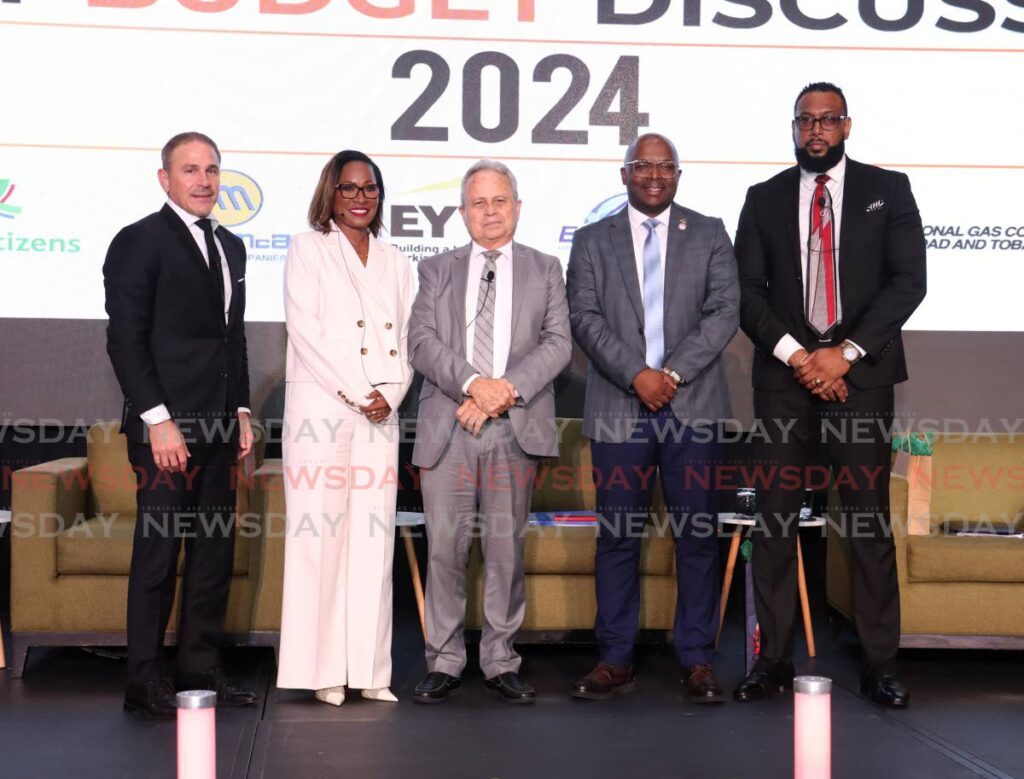Finance Minister on economic growth: People think things are getting better

FINANCE MINISTER Colm Imbert is convinced that not only has the economy been growing consistently over the past three years but people are now feeling the positive effects of that growth.
He was responding to questions during a panel discussion at the TT Manufacturers' Association (TTMA)’s annual post-budget discussion at the Hyatt Regency in Port of Spain on October 1, the day after the 2024/2025 budget was laid in Parliament.
“I do think that quite a few people feel that things are better now than they were five or seven years ago,” he said.
The minister, on September 30, gave a five-hour and thirteen-minute presentation on the budget for the fiscal year ending on September 30, 2025.
He said, while responding to other questions, that most of the money spent in the budget will go to providing free services such as education and healthcare, highly subsidised water and electricity and public transportation.
He said the $7.5 billion allocated to education will affect close to 300,000 students who are either in primary or secondary school or are pursuing higher education.
“We have 250,000 people in schools as far as I can recall and about 15,000 people at UWI and then if you add UTT and the other private institutions, then you will have about 300,000 people actively engaged in education every school day. That is what that $7.5 billion is spent on.”
He said it was not always that way, as in the 1950s, only 400 people had access to government-supported education.
“There was a system where you had to compete. If you were not in that 400, you would have to pay to go to school.
“One of the things that this administration has done, in all of its iterations, is introducing the idea of free education at the primary level and at the secondary level.”
He said the PNM Government has brought the tertiary level participation of secondary school students from 11 per cent in 2004 to 60 per cent in 2009.

On government spending, Imbert said the growth was one of the reasons why the government could increase expenditure from about $50 billion, which was the trend during the leaner periods and covid19, to $59 billion this year.
“We had a very difficult period between 2016, leading up to 2019 and into covid19, where we had to keep expenditure in the $50 billion range.
“Some years, it was $49 billion and $48 billion. That was a big drop from the $60 billion or $62 billion in 2014.
“This year it was $59 billion. That was a great increase in government expenditure for this year in terms of goods and services, wages and salaries.”
He explained that if he had followed the advice of some and reduced expenditure to match revenue, it would have resulted in massive retrenchment, removal of subsidies, increases in utility prices and the removal of free services.
He said this year, the national deficit is $7 billion, two billion less than was projected in the minister’s mid-year review.
For 2025, the government is looking at a deficit of $5.5 billion.
He said until natural gas production rebounds in 2027, the government will continue to keep the economy’s momentum going by investing its expenditure in essential services for the population.
TTMA president Ronald Roach said there were examples of tangible effects of economic growth in the private sector.
“Over the last two years, the manufacturing sector invested about $2.4 billion of capital investment. That investment, according to our tracking, generated 2,300 new jobs. That is a tangible example of what growth does.
“The sector wouldn’t invest that kind of money if there wasn’t economic growth or the propensity for growth locally, regionally and internationally.
“It is because of the growth figures that we are seeing and the demand that has been made for locally manufactured products that propels these companies to make this investment in plant and equipment.”
But one speaker, Jason Mohammed, worried that signs of poverty seen plainly in the streets of Trinidad and Tobago suggest that the nation is not using its resources wisely.
“When I drive through Port of Spain on my way home and you see people sleeping on the side of the street and you see kids not doing well in school and you wonder what their futures will look like if they can’t pass maths or English.
“It makes me wonder: are we using it in a way that is efficient and delivers what the population and society and the community needs?
“It is heartbreaking to see that we are spending millions of US dollars and this is where we are. That is a tragedy of TT to me and I would regret not saying that today.”
Other sectors urged to pick up slack from oil and gas industry
National Gas Company (NGC) chairman Dr Joseph Ishmael Khan expressed confidence that several deals, such as the Dragon Gas deal and the Manakin-Cocuina deal, will result in significant gas volumes in 2027.
But he said while gas production rebounds, it is incumbent on other sectors to bridge the revenue gap seen as a result of naturally declining hydrocarbon resources.
“We cannot forget that we have sectors such as agriculture, tourism, the creative industries, manufacturing and education.
“Based on the budget, there are other incentives and opportunities available. Yes, we are an oil and gas-based economy but we cannot sit and wait on oil and gas. We have to be able to go into those other sectors and produce and become driven by the various economic activities that will boost the economy.”
“My honest opinion is that the fiscal regimes and policies that were outlined yesterday is one that empowers people,” Khan added.
“If you look at it from that perspective, the private sector and individuals can take advantage of many things inside there and cause us to be creative and entrepreneurial. I think that has to be something that we look at. A lot of times, we would want the government to give but it is time that we, as the people of TT, start seeing the opportunities in everything we do.”
Ernst and Young Caribbean (EY) executive chairman Wade George said the new Special Economic Zones (SEZ) regime and other initiatives to boost the business community could give the private sector the opportunities to bridge that revenue gap.

“Often we sit back as a business community and a population and we ask, ‘What is the government doing?’
“But I think it is incumbent on us to do what we can to exercise all of our resources that we have to earn foreign exchange and find opportunities in business.
“There is always a need to be served. This legislation provides you with a framework of incentives, including 15 per cent tax benefits, property tax exemptions.
“There are many criteria that would allow micro, small, and medium-sized enterprises to participate in various sectors across the country. It is no longer about what is the government going to do. It is now up to the private sector to be able to make the investments.”
Economist Dr Marlene Attzs said TT has become so heavily dependent on oil and gas revenues that some people would find it daunting to rely on other industries for the same levels of revenue.
“What has happened to TT and the population is the classic example of ‘Dutch disease.’
“Because we are so heavily dependent on the energy sector, our population really doesn’t understand anything outside of that so now that we are in a space where we have to, as individuals, as non-government actors and other actors, we have to take responsibility to do our part to fill the gap left by the energy sector, for some people that is a daunting task.”
On September 30, Imbert said the economy grew by 1.3 per cent in 2023, following growth of 1.5 per cent in 2022. This year, real GDP growth increased to 1.9 per cent, making it three consecutive years of real growth. He said this was a signal of economic activity, a rebound in confidence and a promising trajectory towards a positive economic environment.

Comments
"Finance Minister on economic growth: People think things are getting better"